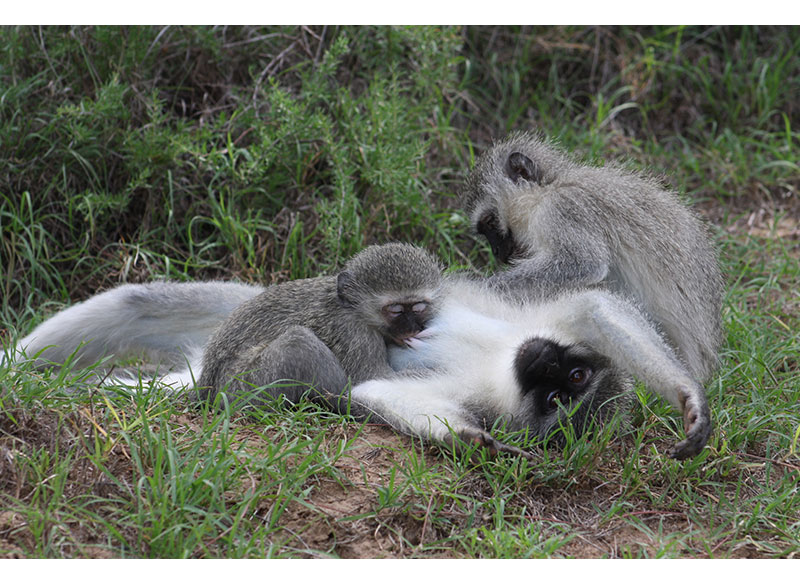Monkey mothers shown to put babies at risk during drought
The internal body temperature of pregnant and breastfeeding monkeys has been shown to rise during times of drought – threatening the optimum conditions needed for successful reproduction and weaning, putting infants at risk.
By Helen Breese | Published on 12 March 2024
Categories: Press office; Research; School of Social Sciences;

A study by researchers at Nottingham Trent University (NTU) used data loggers to monitor the internal temperature of 30 wild vervet monkeys in South Africa over an eight-year period – including two years of drought – when 23 babies were born.
When resources were abundant, pregnant mothers were found to have a regulated body temperature which provides the best conditions for their unborn babies and accelerates development.
However, in a time of drought when food and water were scarce, their body temperatures were higher than normal, potentially risking the baby’s wellbeing but better ensuring their own survival.
During the drought, the mothers also experienced increasingly high body temperatures when breastfeeding after birth – more so than their non-reproductive peers – due to the increased energetic demands of producing milk.

Associate Professor Richard McFarland, School of Social Sciences
Lead researcher Dr Richard McFarland, Associate Professor in Primate Behavioural Ecology in NTU’s School of Social Sciences, said: “We observed a trade-off between a mother’s investment in their offspring and their own survival prospects when facing extreme environmental conditions.
“These findings demonstrate that the regulation of maternal temperature is tied to both reproductive processes and the availability of resources, and there is flexibility in temperature regulation which aids both survival and successful reproduction even in sub-optimal conditions.
“Fortunately, almost all pregnancies survived the drought, suggesting a mother, despite her shifting priorities, still managed to support her offspring during pregnancy. Almost - one mother and her infant died on the day of birth, suggestive of the potential impact that reduced resources can have on the survival chances of some individuals.
“Climate change is predicted to increase the frequency and intensity of droughts in sub-Saharan Africa and will further reduce access to the resources needed for these monkeys to sustain pregnancy and breastfeeding. If these trade-offs between offspring survival and self-maintenance fail, this will not only result in pregnancy loss or difficulties during birth but may also have more long-term costs to individual and population-level reproductive success.”
The paper Mother-offspring conflict and body temperature regulation during gestation and lactation in a wild primate, McFarland, Richard; Henzi, Peter; Fuller, Andrea; Hetem, Robyn; Young, Christopher; Barrett, Louise has been published by the journal Functional Ecology.
Notes for Editors
Press enquiries please contact Helen Breese, Public Relations Manager, on telephone +44 (0)115 848 8751, or via email.
About Nottingham Trent University
Nottingham Trent University (NTU) received the Queen’s Anniversary Prize for Higher and Further Education in 2021 for cultural heritage science research. It is the second time that NTU has been bestowed the honour of receiving a Queen’s Anniversary Prize for its research, the first being in 2015 for leading-edge research on the safety and security of global citizens.
The Research Excellence Framework (2021) classed 83% of NTU’s research activity as either world-leading or internationally excellent. 86% of NTU’s research impact was assessed to be either world-leading or internationally excellent.
NTU was awarded The Times and The Sunday Times Modern University of the Year 2023 and ranked University of the Year in the Whatuni Student Choice Awards 2023. It was awarded Outstanding Support for Students 2020 (Times Higher Education Awards), University of the Year 2019 (Guardian University Awards, UK Social Mobility Awards), Modern University of the Year 2018 (Times and Sunday Times Good University Guide) and University of the Year 2017 (Times Higher Education Awards).
NTU is the 5th largest UK institution by student numbers, with approximately 40,000 students and more than 4,400 staff located across five campuses. It has an international student population of 7,000 and an NTU community representing over 160 countries.
Since 2000, NTU has invested £570 million in tools, technology, buildings and facilities.
NTU is in the UK’s top 10 for number of applications and ranked first for accepted offers (2021 UCAS UG acceptance data). It is also among the UK’s top five recruiters of students from disadvantaged backgrounds and was the first UK university to sign the Social Mobility Pledge.
NTU is ranked the second most sustainable university in the world in the 2022 UI Green Metric University World Rankings (out of more than 900 participating universities).